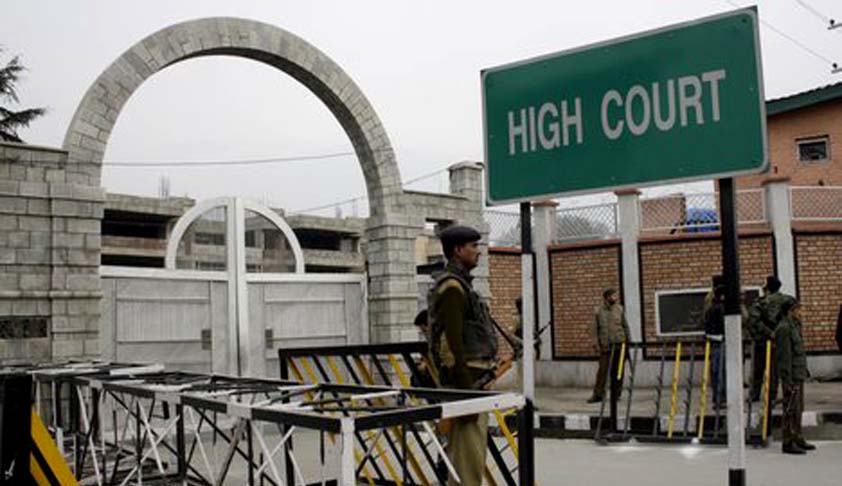‘Provide toll free telephone numbers for lodging complaints’
Excelsior Correspondent
JAMMU, Mar 31: High Court has directed the Education Department to implement Rule 10 of the Employees Conduct Rules in letter and spirit and ensure that no member of its teaching faculty engages in private tuition at private coaching/tuition centres without previous sanction of the Government.
Moreover, High Court has directed that the Zonal Education Officers and Chief Education Officers shall be the nodal officers, who will ensure the implementation of Rule 10 of the Employees Conduct Rules and the circular/instructions, if any, issued by the Government to give effect to Rule 10 of the Employees Conduct Rules.
This significant order has been passed in a petition filed by father of two children studying in 10th & 12th classes, who felt aggrieved of circular bearing No.CEO/K/Monitoring/20/14887-967 dated 21.11.2020, whereby all the DDOs/Controlling Officers have been called upon to issue strict instructions to all teaching officials (Lecturers/ Masters/ Teachers) working under their control not to indulge in private practice of giving luxury education at private coaching institutions.
The impugned circular is purported to have been issued under Section 28 of the Right of Children to Free and Compulsory Education Act, 2009, which has become applicable to the Union Territory of Jammu & Kashmir in terms of the Jammu & Kashmir Reorganization Act, 2019.
After hearing both the sides, Justice Sanjeev Kumar observed, “Rule 10 of the Employees Conduct Rules has only remained on papers and has not been implemented by the Government in its letter and spirit so far”, adding “the attempts made by the Government on two earlier occasions have been aborted by the teaching faculty of the School Education Department by putting up so called parents of the students and engaging the State in litigation”.
“Without sermonizing on the role of teachers in the national building, suffice it to say that teacher in our society is a role model and is given a pious duty of making and moulding the career and character of the students. Teachers these days are paid hefty salary by the Government and there is no pressing necessity for them to engage in private tuitions that, too, on many occasions at the cost of their students in the Government institutions”, High Court said, adding “it is pity that the standard of education in the Government institutions has gone down drastically, though the best teaching faculty is available in the Government run institutions”.
Justice Sanjeev Kumar further observed, “the Government teachers are highly qualified and are imparted various trainings from time to time at the expense of Government to equip them with the latest teaching techniques and methodology”, adding “instead of concentrating on their pious job and contribute to the nation building, the God has chosen for them, for, they, moved by their insatiable greed, engage in activity of private tuition either at their residence or in private coaching centres”.
“Many a times, they skip their classes in the Government schools so as to show up in the private coaching centres. Their engagement in activity of private coaching invariably slows down their performance in the Government schools. It is with a view to avoid such unsavory situation and to prevent the Government employees from engaging in private occupations, which may directly or indirectly be in conflict with their official duties, the Employees Conduct Rules, have been framed”, High Court said, adding “Rule 10 of the Employees Conduct Rules takes care of the situation we are confronted with in this petition”.
“If Rule 10 of the Employees Conduct Rules is implemented by the Government in all the departments particularly in the Department of Education in letter and spirit, the menace of private tuition by Government teaching faculty could be eradicated and the teaching faculty can be made accountable and responsible towards the students who completely depend on Government institutions for their education and have no means to pay for private tuitions”, High Court said.
With these observations, Justice Sanjeev Kumar disposed of the petition with the observations that the impugned circular issued by the Chief Education Officer, Kishtwar is beyond the scope and ambit of the Act of 2009 particularly Section 28 thereof and therefore, cannot be applied to the Government teaching faculty of higher secondary schools and colleges.
“The circular would have its applicability only to the Government schools imparting elementary education i.e. schools up to 8th standard. The circular to this extent is, thus, upheld”, High Court said.
“Any circular issued to give effect to Rule 10 of the Employees Conduct Rules, would be valid in law and it would be the responsibility of all DDOs and controlling authority to ensure that it is implemented in letter and spirit”, Justice Kumar said and directed the Department of Education (school as well as higher education) to implement Rule 10 of the Employees Conduct Rules in letter and spirit and ensure that no member of its teaching faculty engages in private tuition at private coaching/tuition centres without previous sanction of the Government.
High Court further directed the Government to create and provide toll free telephone number in each district where the complaint(s) against the banned activity of the teaching faculty could be made. The Government may create a web portal/grievance cell for receiving and redressal of the complaint(s) made by the citizens against the banned activities of the teaching faculty of the Government.


